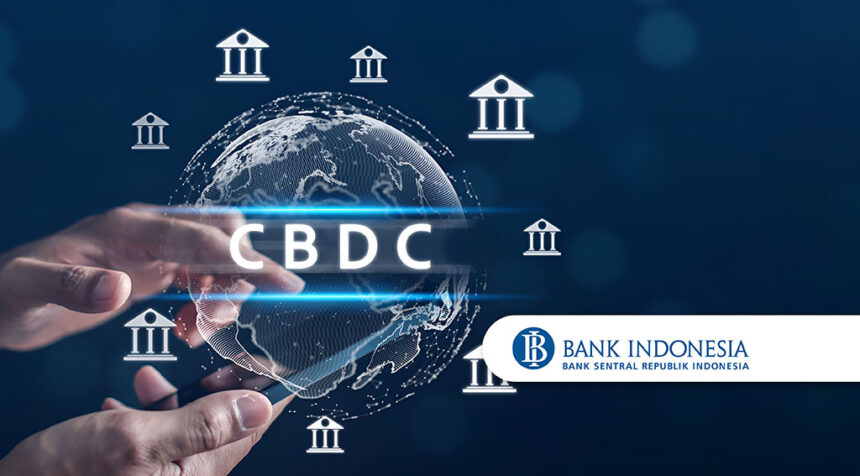Indonesia has reached an important milestone in its journey to explore the potential of central bank digital currencies (CBDCs). Completed Proof of Concept (PoC) for Wholesale Digital Rupiah under the auspices of Bank Indonesia’s project Garuda.
Indonesia’s key takeaways highlight the country’s commitment to leveraging digital technology to modernize its payments system while safeguarding financial stability and promoting inclusiveness.
This PoC represents the immediate phase of Project Garuda, a project aimed at exploring the application of distributed ledger technology (DLT) in building a secure and efficient wholesale digital currency system.
Bank Indonesia tested two DLT platforms, R3’s Corda and Kaleido’s Hyperledger Besu, to assess their feasibility and alignment with the unique characteristics of Indonesia’s financial ecosystem.
Explore proof of concept goals and challenges
The main objective of the PoC was to determine the feasibility of DLT in implementing a large-scale digital rupiah cash ledger (wRD). Designed for seamless integration, wRD supports Indonesia’s payment system while maintaining currency stability and avoiding the creation of additional monetary value.
To achieve this, the PoC focused on three key processes: issuance, redemption, and funds transfer.
The process includes converting reserve account balances into digital rupiah and vice versa, ensuring seamless interoperability with Bank Indonesia’s Real-Time Gross Settlement (BI-RTGS) system. Masu. You can convert your account balance to digital rupiah and vice versa while ensuring seamless interoperability with Bank Indonesia’s Real-Time Gross Settlement (BI-RTGS) system.

The PoC included 55 detailed test scenarios that evaluated the platform’s performance in resiliency, privacy, scalability, and fault tolerance. The platform meets all criteria and has demonstrated the ability to effectively support the systems for which it is intended.
Additionally, the adoption of interoperability standards such as ISO 20022 has resolved integration challenges and enabled compatibility with national and international financial market infrastructures.
Pioneering technological advances
One of the key outcomes of the PoC was the demonstration of smart contracts, which are self-executing code embedded within a blockchain.
Smart contracts automate key processes, minimizing human intervention and increasing the security of transactions. Such innovations have streamlined operations and paved the way to explore advanced financial products such as delivery versus payment (DvP) mechanisms.
The PoC demonstrated the transformative potential of DLT-based systems in improving liquidity management. Distributing the responsibility for transaction validation across network nodes reduced dependence on a central authority, increasing resilience and operational efficiency.
Each platform demonstrated unique strengths. While Corda utilized a notary system for transaction validation, Hyperledger Besu used a proof-of-authority consensus mechanism to ensure robust processing.
The research includes the introduction of privacy models and advanced multi-validators, offering the potential to protect sensitive transaction data while enabling seamless integration with the broader financial system. For example, the observer node functionality implemented during the PoC enabled Bank Indonesia to monitor transactions without compromising participant confidentiality.
Build success through collaboration
Stakeholder involvement was critical to the success of the PoC. Input from academia, industry leaders, and government agencies influenced the design and architecture of Wholesale Digital Rupiah.
The joint efforts are in line with the Indonesia Payment System Blueprint 2030, which prioritizes innovation, financial inclusion and economic sustainability.
Inclusiveness has made the digital rupiah system adaptable and robust, allowing it to address Indonesia’s unique challenges, such as its geographically dispersed population and diverse economic activities. Bank Indonesia ensured that the Digital Rupiah remains relevant and effective in addressing real-world challenges by incorporating iterative feedback from stakeholders.
Transition from immediate to intermediate state
Before we talk about intermediate states, let’s first know what direct states are.
First, the immediate state phase demonstrated the feasibility of the digital rupiah and its seamless integration with existing systems. The issuance and redemption process follows the principle of financial neutrality, converting funds between reserve accounts and the digital rupiah without changing the overall money supply.
The integration with BI-RTGS has demonstrated that the system is compatible with Indonesia’s financial market infrastructure.
Smart contracts played a key role in automating these processes. The ability to enforce predefined conditions increases efficiency by reducing manual intervention and minimizing errors.
The implementation of a decentralized funds transfer process further optimizes liquidity management and enables real-time transactions verified by distributed nodes.
Another important feature is system scalability and fault tolerance. These platforms can handle large volumes of transactions and have seamlessly proven themselves capable of large-scale deployments.
The PoC findings also revealed the potential to incorporate advanced features such as zero-knowledge proofs to enhance transaction privacy.
Following the success of the immediate state, the intermediate state stage will expand the use cases for digital assets. This includes the integration of digital securities and the introduction of DvP mechanisms. These advances will expand the usefulness of the digital rupiah within the Indonesian financial ecosystem and potentially in cross-border contexts as well.
In the next phase, privacy-enhancing technologies such as multi-signature verification and advanced cryptographic models will be further explored to maintain confidentiality and security.
Such features are critical to maintaining the confidentiality and security of transactions, especially as the scope of the digital rupiah expands.

Indonesia’s role in global digital currency leadership
With the success of the Digital Rupiah pilot, Indonesia has established itself as a leader in the global exploration of wholesale CBDC. Addressing the challenges of interoperability, scalability, and security, Indonesia is setting a global example for countries seeking similar initiatives.
The emphasis on stakeholder collaboration and innovation underscores Indonesia’s commitment to building a resilient and inclusive digital financial ecosystem.
The digital rupiah is also expected to strengthen Indonesia’s economic sovereignty. As a secure and efficient medium for domestic and cross-border transactions, the rupiah’s relevance in an increasingly digital global economy is ensured.
Additionally, the project aligns with broader economic objectives by promoting financial inclusion and supporting sustainable growth.
Indonesia’s successful completion of the Digital Rupiah demonstration project highlights Indonesia’s vision and ability to navigate the complexities of CBDC development.
Through the adoption of advanced technologies and collaborative frameworks, Indonesia is charting a path to digital financial transformation. Indonesia is charting a path to digital financial transformation while fostering cooperation.
With each step of Project Garuda, the potential of the digital rupiah to revolutionize payment systems and foster economic inclusion becomes clearer.
Each step brings Indonesia closer to achieving a secure, efficient and inclusive financial future, ensuring the country remains at the forefront of global digital innovation.
Featured image credit: Edited from freepic





